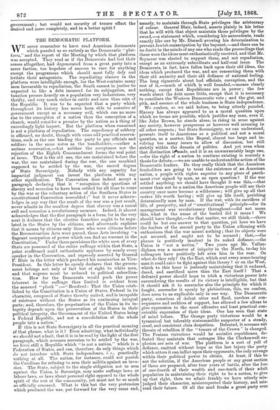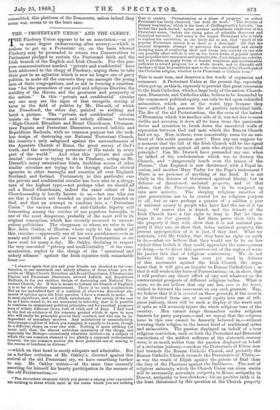THE DEMOCRATIC PLATFORM.
WE never remember to have read American documents which puzzled us so entirely as the Democratic " plat- form," and the report of the Meeting by which that platform was accepted. They read as if the Democrats had lost their senses altogether, had degenerated from a great party into a mere faction, too hopeless of success to care for anything except the programme which should most fully defy and irritate their antagonists. The repudiating clauses in the platform were intelligible enough, for the West contains many men favourable to repudiation, the South cannot in justice be expected to like a debt incurred for its subjugation, and taxation presses heavily on a population very industrious, very thrifty, and very much richer in cattle and corn than coin of the Republic. It was to be expected that a party which throughout its history has never been able to conceive of government except as a necessary evil, which can no more rise to the conception of a nation than the conception of a church, would consider a promise by the nation as a thing of exceedingly light import. But the platform when examined is not a platform of repudiation. The expediency of robbery is affirmed, no doubt, though with some odd practical reserva- tions, such as the one binding the party to pay officials and soldiers in the same notes as the bondholders,—rather a serious reservation,—but neither the acceptance nor the rejection of the Eighth Commandment forms the real point at issue. That is the old one, the one maintained before the war, the one maintained during the war, the one mankind supposed to be settled by the war, the sacred dogma of State Sovereignty. Nobody with any capacity for impartial judgment can invest the platform with any other signification. The Convention does indeed accept a paragraph declaring that it " recognizes the questions of slavery and secession to have been settled for all time to come by the war or the voluntary action of the Southern States in constitutional Convention assembled ;" but it never acknow- ledges in any way that the result of the war was a just result, never admits in the smallest degree that slavery was a moral evil and secession a revolutionary measure. Indeed, it almost acknowledges that the first paragraph is a form, for in the very next it declares that the elective franchise ought to be regu- lated in the States by the citizens, and afterwards explains that it means by citizens only those who were citizens before the Reconstruction Acts were passed, those Acts involving "a flagrant usurpation of power which can find no warrant in the Constitution." Under these provisions the white men of every State are possessed of the entire suffrage within that State, a point reaffirmed amid enthusiastic applause by nearly every speaker in the Convention, and expressly asserted by General F. Blair in the letter which produced his nomination as Vice- President. In this letter he openly declares that the govern- ment belongs not only of fact but of right to white men, and that negroes must be reduced to political subordina- tion. How far the Democrats would push the power inherent in the suffrage thus limited is evident from the annexed " plank " :—" Resolved : That the Union estab- lished by the Constitution is a Union of States, Federal in its character, composed of States thereby united, and is incapable of existence without the States as its continuing integral parts; and, therefore, the perpetuation of the Union in its in- tegrity depends upon the preservation of the States in their political integrity, the Government of the United States being a Federal Republic, and not a consolidation of the whole people into a nation."
If this is not State Sovereignty in all the practical meaning of that phrase, what is it Even admitting, what individually we should not admit, that it is to be read by the light of the first paragraph, which assumes secession to be settled by the war, we have still a Republic which " is not a nation," which is a Federation of States, and can, therefore, do only things which do not interfere with State independence, i. e., practically nothing at all. The nation, for instance, could not punish the Carolinas for refusing to arm their militia against an inva- sion. The State, subject to the single obligation not to arm against the Union, is Sovereign, may make suffrage laws, or labour laws, or laws about personal right opposed to the whole spirit of the rest of the community, yet must not be so much as officially censured. What is this but the very pretension which produced the war, put forward for the very same end, namely, to maintain through State privileges the aristocracy of colour. General Blair, indeed, asserts plainly in his letter that he will with that object maintain those privileges by the sword,—a statement which, considering his antecedents, reads exactly like one by Mr. Disraeli avowing his determination to prevent Jewish emancipation by the bayonet,—and there can be no doubt in the minds of any one who reads the proceedings that these were the ideas most enthusiastically received, and that Mr. Seymour was elected to support them, and not repudiation, except as an extremely subordinate and half-real issue. The Democrats, in fact, have fallen back upon their old ideas, the ideas which produced the war, and are reasserting them with their old audacity and their old defiance of national feeling. The long rigmarole about bad officials, corruption, and the rest of it,—much of whicli is well founded,—means clearly nothing, except that Republicans are in power ; the few words about the debt mean little, except that it is necessary to conciliate the Western Democratic vote ; and the gist, and pith, and essence of the whole business is State independence.
We confess, as we said before, to being utterly puzzled. Slavery has always appeared to us a moral question upon which no terms are possible, which justifies any man, even if, like John Brown, he stands alone, in rising in arms against any society, however prosperous or however well meaning in all other respects ; but State Sovereignty, we can understand, presents itself to Americans as a political and not a moral question, as a matter, like Repeal, almost too large and in- volving too many issues to allow of discussion, but still strictly within the domain of politics. And yet even when that distinction iA•made, and it is an unwarrantably large one, —for the right of a nation to continue existing is scarcely a thesis for debate,—we are unable to understand the action of the Democratic leaders. Do they really think that the American freeholders are going to treat the existence of an American nation, a people with rights superior to any piece of parch- ment ever signed by man, as an open question If the war settled anything, we should have thought it was this,—that sooner than not be a nation the American people will see their country once more become a wilderness ; will give up all that makes life worth having ; will give up life itself, perishing determinedly man by man. If the war, with its sacrifices of life, of prosperity, and of "constitutional " principle—for its management was revolutionary throughout—did not mean this, what in the name of the buried did it mean ? We should have thought,—for that matter, we still think,—there could be but one answer to that question, yet here we have the leaders of the second party in the Union affirming with enthusiasm that the war meant nothing ; that its objects were not secured, and ought not to be secured ; that,—the phrase is positively insolent in its naked defiance,—the Union is " not a nation." Two years ago Mr. Vallan- digham was a monster of iniquity in the North, to-day his colleagues have positively left even him in the rear. On what do they rely? On the East, which sent every arms-bearing man it could raise to fight against this theory ? or on the West, which to this hour is jealously maintaining that it endured, dared, and sacrificed more than the East itself ? That a defeated power should hope to trick a victorious power into surrendering the results of its victory is intelligible, but that it should ask it to surrender also the principle for which it fought, surrender it openly by plebiscitum, this, we confess, does seem to us explicable only in one way. The Democratic party, conscious of defeat utter and final, careless of con- sequences and reckless of support, has allowed a few ultras to give expression to the most offensive and least practical con- ceivable expression of their ideas. One has seen that state of mind before. The Orange party victorious would be s tyrannical but tolerably statesmanlike supporter of a steady, cruel, and consistent class despotism. Defeated, it screams out threats of rebellion if the " tenure of the Crown " is changed. The Fenians victorious would be socialist republicans, de- feated they maintain that outrages like the Clerkenwell ex- plosion are acts of war. The platform is a sort of yell of defiance, emitted without hope as the last injury the party which utters it can inflict upon their opponents, the only revenge within their political power to obtain. At least, if this be not the solution, if the American people or any great section of them are prepared, after four years of battle, after the loss of one-fourth of their wealth and one-tenth of their adult population in maintaining their right to be a nation, to give up that right, then we admit frankly we have utterly mis- judged their character, misinterpreted their history, and mis- read their future. Of all the mad freaks a great party ever
committed, this platform of the Democrats, unless indeed they mean war, seems to us the least sane.































 Previous page
Previous page